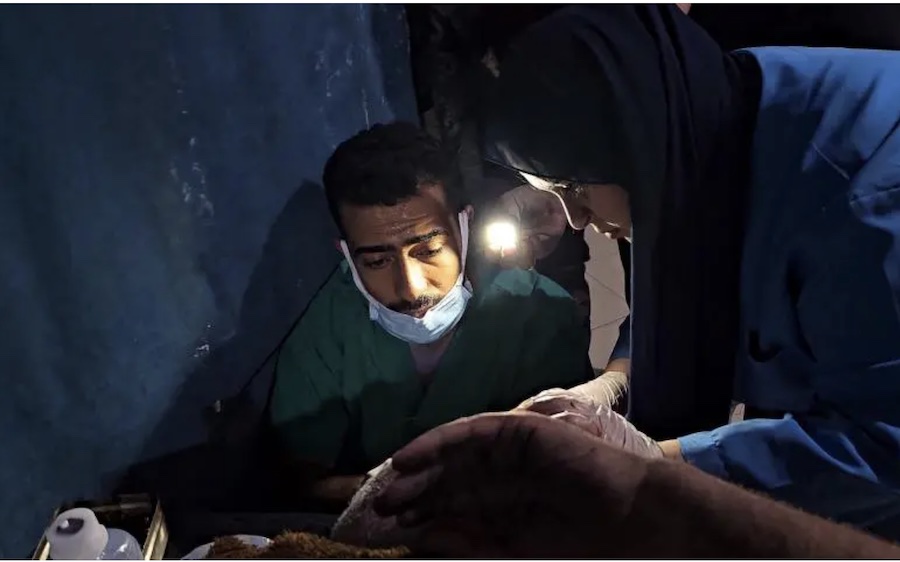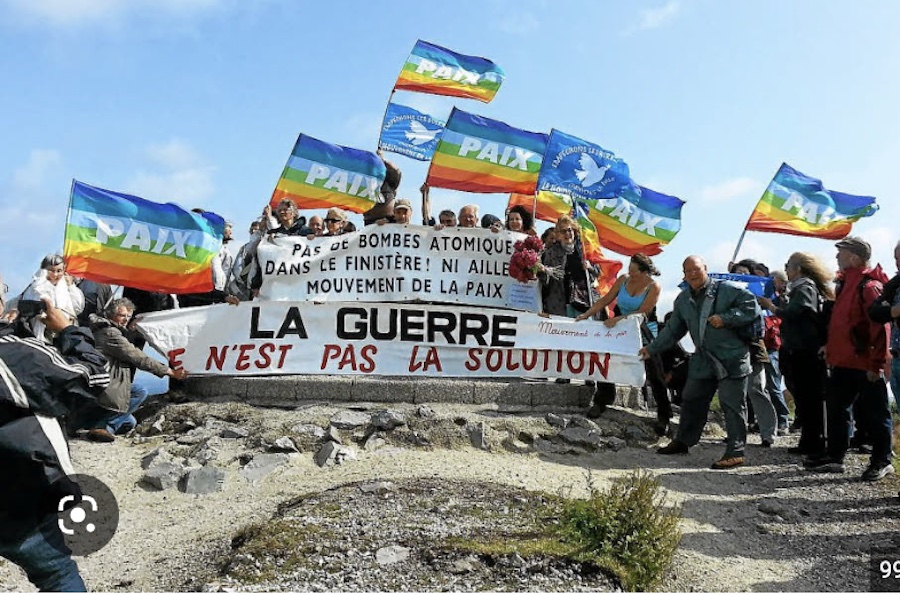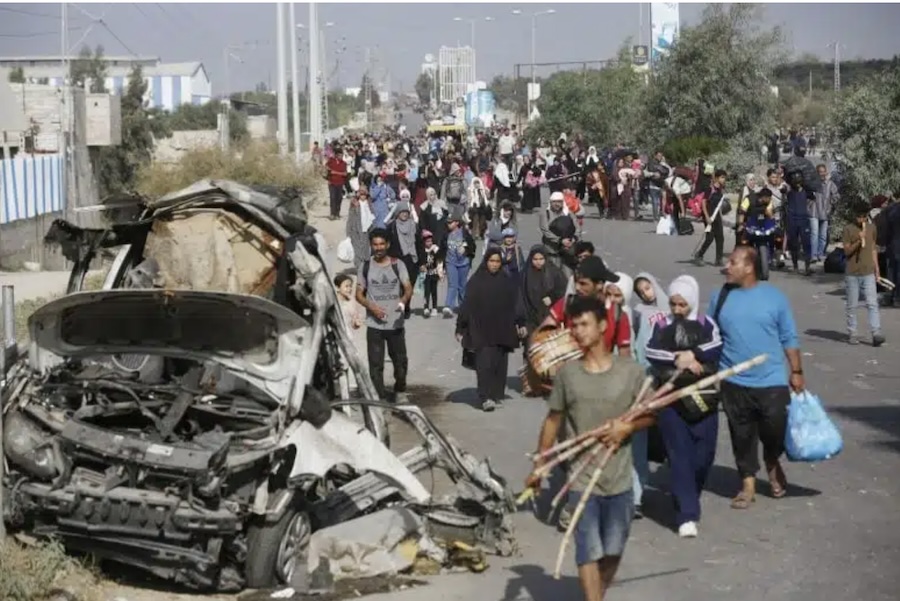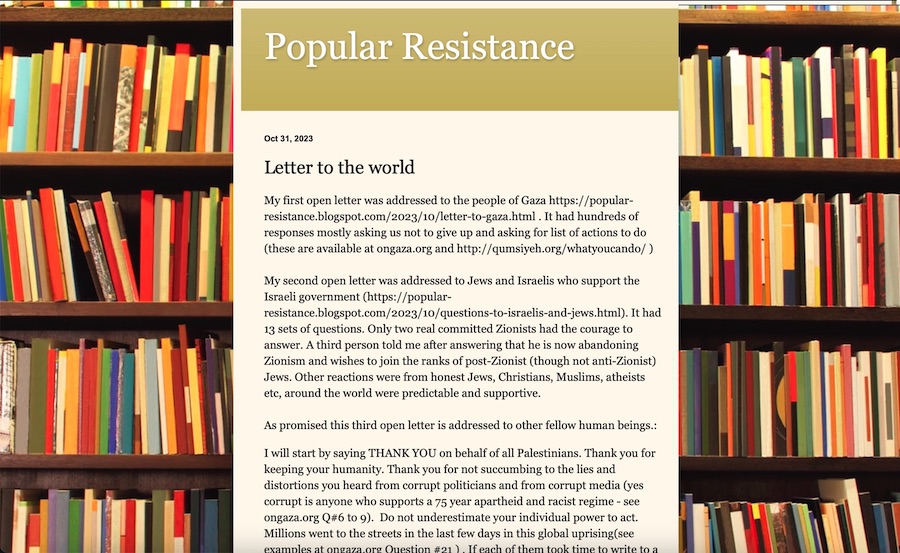. . HUMAN RIGHTS . .
An article from Human Rights Watch (Creative Commons license BY-NC-ND/3.0/us/)
° The Israeli military’s repeated, apparently unlawful attacks on medical facilities, personnel, and transport are further destroying Gaza’s healthcare system and should be investigated as war crimes.
° Concerns about disproportionate attacks are magnified for hospitals. Even the threat of an attack or minor damage can have massive life-or-death implications for patients and caregivers.
° The Israeli government should end attacks on hospitals. The Independent International Commission of Inquiry on the Occupied Palestinian Territory and the ICC should investigate.

Medical workers treat a Palestinian injured in an Israeli strike, using flashlights due to the lack of electricity at the Indonesian Hospital in the northern Gaza Strip, November 10, 2023. © 2023 Anas al-Shareef/Reuters
(Jerusalem) – The Israeli military’s repeated, apparently unlawful attacks on medical facilities, personnel, and transport are further destroying the Gaza Strip’s healthcare system and should be investigated as war crimes, Human Rights Watch said today. Despite the Israeli military’s claims on November 5, 2023, of “Hamas’s cynical use of hospitals,” no evidence put forward would justify depriving hospitals and ambulances of their protected status under international humanitarian law.
(Note by the editor: There is no doubt that there are tunnels and bunkers underneath Al Shifa hospital, because they were constructed not by Hamas but by the Israelis, according to a recent CNN interview with a former Israeli prime minister.)
The World Health Organization (WHO) has reported that at least 521 people, including 16 medical workers, have been killed in 137 “attacks on health care” in Gaza as of November 12. These attacks, alongside Israel’s decisions to cut off electricity and water and block humanitarian aid to Gaza, have severely impeded health care access. The United Nations found as of November 10 that two-thirds of primary care facilities and half of all hospitals in Gaza are not functioning at a time when medical personnel are dealing with unprecedented numbers of severely injured patients. Hospitals have run out of medicine and basic equipment, and doctors told Human Rights Watch that they were forced to operate without anesthesia and to use vinegar as an antiseptic.
“Israel’s repeated attacks damaging hospitals and harming healthcare workers, already hard hit by an unlawful blockade, have devastated Gaza’s healthcare infrastructure,” said A. Kayum Ahmed, special adviser on the right to health at Human Rights Watch. “The strikes on hospitals have killed hundreds of people and put many patients at grave risk because they’re unable to receive proper medical care.”
Human Rights Watch investigated attacks on or near the Indonesian Hospital, al-Ahli Hospital, the International Eye Care Center, the Turkish-Palestinian Friendship Hospital, and the al-Quds Hospital between October 7 and November 7. Human Rights Watch spoke by phone with two displaced people sheltering in hospitals and 16 healthcare workers and hospital officials in Gaza and analyzed and verified open-source data, including videos posted to social media and satellite imagery, as well as WHO databases.
Israeli forces struck the Indonesian Hospital multiple times between October 7 and October 28, killing at least two civilians. The International Eye Care Center was struck repeatedly and completely destroyed after a strike on October 10 or 11. Strikes hit the compound and vicinity of the Turkish-Palestinian Friendship Hospital on October 30 and 31. Damage to the hospital as well as a lack of fuel for hospital generators resulted in its closure on November 1. Repeated Israeli strikes damaged the al-Quds Hospital and injured a man and child out front. Israeli forces on several occasions struck well-marked ambulances, killing and wounding at least a dozen people in one incident on November 3, including children, outside al-Shifa hospital.
These ongoing attacks are not isolated. Israeli forces have also carried out scores of strikes damaging several other hospitals across Gaza.
WHO reported that as of November 10, 18 out of 36 hospitals and 46 out of 72 primary care clinics were forced to shut down. The forced closure of these facilities stems from damage caused by attacks as well as the lack of electricity and fuel.
Health workers at Gaza’s hospitals told Human Rights Watch they are dealing with unprecedented numbers of injured patients. Additionally, thousands of internally displaced people sheltering at hospitals have been put at risk, facing shortages of food and medicine. Gaza’s hospitals have been forced to address these issues with shortages of medical staff, some of whom have been killed or injured outside their work.
A doctor at Nasser Medical Center said: “At 3 a.m. I dealt with a 60-year-old woman with a cut wound in her head. I can’t make a suture to heal her wound—no gloves, no equipment—so we have to use unsterile techniques.”
Hospitals and other medical facilities are civilian objects that have special protections under international humanitarian law, or the laws of war. Hospitals only lose their protection from attack if they are being used to commit “acts harmful to the enemy,” and after a required warning. Even if military forces unlawfully use a hospital to store weapons or encamp able-bodied combatants, the attacking force must issue a warning to cease this misuse, set a reasonable time limit for it to end, and lawfully attack only after such a warning has gone unheeded. Ordering patients, medical staff, and others to evacuate a hospital should only be used as a last resort. Medical personnel need to be protected and permitted to do their work.
All warring parties must take constant care to minimize harm to civilians. Attacks on hospitals being used to commit “acts harmful to the enemy” are still unlawful if indiscriminate or disproportionate. The use of explosive weapons in densely populated areas heightens the risk of indiscriminate attacks. Attacks in which the anticipated loss of civilian life and property are excessive compared with the concrete and direct military gain are disproportionate. Concerns about disproportionate attacks are magnified with respect to hospitals, since even the threat of an attack or minor damage can have massive life-or-death implications for patients and their caregivers.
The Israeli military on October 27 claimed that “Hamas uses hospitals as terror infrastructures,” publishing footage alleging that Hamas was operating from Gaza’s largest hospital, al-Shifa. Israel also alleged that Hamas was using the Indonesian Hospital to hide an underground command and control center and that they had deployed a rocket launchpad 75 meters from the hospital.
These claims are contested. Human Rights Watch has not been able to corroborate them, nor seen any information that would justify attacks on Gaza hospitals. When a journalist at a news conference showing video footage of damage to the Qatar Hospital sought additional information to verify voice recordings and images presented, the Israeli spokesperson said, “our strikes are based on intelligence.” Even if accurate, Israel has not demonstrated that the ensuing hospital attacks were proportionate.
Israel’s general evacuation order on October 13 to 22 hospitals in northern Gaza was not an effective warning because it did not take into account the specific requirements for hospitals, including providing for the safety of patients and medical personnel. The sweeping nature of the order and the impossibility of safe compliance, given that there is no reliably secure way to flee or safe place to go in Gaza, also raised concerns that the purpose was not to protect civilians, but to terrify them into leaving. The WHO director general has said that “it’s impossible to evacuate hospitals full of patients without endangering their lives.”
The Israeli government should immediately end unlawful attacks on hospitals, ambulances, and other civilian objects, as well as its total blockade of the Gaza Strip, which amounts to the war crime of collective punishment, Human Rights Watch said. Hamas and other Palestinian armed groups need to take all feasible precautions to protect civilians under their control from the effects of attacks and not use civilians as “human shields.”
The Independent International Commission of Inquiry on the Occupied Palestinian Territory, including East Jerusalem, and Israel should investigate apparently unlawful Israeli attacks on healthcare infrastructure in Gaza.
The International Criminal Court prosecutor has jurisdiction over the current hostilities between Israel and Palestinian armed groups that covers unlawful conduct by all parties. The ICC’s Rome Statute prohibits as a war crime “[i]ntentionally directing attacks against … medical units and transport.” Israeli and Palestinian officials should cooperate with the commission and the ICC in their work, Human Rights Watch said.
The United States, United Kingdom, Canada, Germany, and other countries should suspend military assistance and arms sales to Israel as long as its forces continue to commit widespread, serious abuses amounting to war crimes against Palestinian civilians with impunity. All governments should demand that Israel restore the flow of electricity and water to Gaza and allow in fuel and humanitarian aid, ensuring that water, food, and medication reach Gaza’s civilian population.
“Israel’s broad-based attack on Gaza’s healthcare system is an attack on the sick and the injured, on babies in incubators, on pregnant people, on cancer patients,” Ahmed said. “These actions need to be investigated as war crimes.”
Blockade’s Effect on Hospitals
Israel’s blockade has severely constrained hospitals, which have run out of essential medicines and basic equipment. While Israeli authorities have allowed minimal humanitarian aid into Gaza, they have continued to block the entry of fuel, which hospitals need for their generators. WHO reported that “hospitals are on the brink of collapse due to the shortage of electricity, medicine, equipment and specialized personnel.”
On October 22, the United Nations Children’s Fund (UNICEF) expressed grave concern about the impact of the blockade. They noted that 120 newborn children were in incubators, 70 of whom required mechanical ventilation. The incubators and ventilators cannot operate without a stable electricity supply. “The death toll will increase exponentially if incubators start to fail, if hospitals go dark, if children continue to drink unsafe water and have no access to medicine when they get sick,” UNICEF said. Between November 11 and 13, three premature babies and 29 other patients reportedly died at al-Shifa hospital amid the power outage and lack of medical supplies, according to UN Office of the Coordination of Humanitarian Affairs (OCHA).
Emerging reports show that unsanitary conditions at hospitals are further affecting access to health care. Tanya Haj Hassan, a doctor who runs a support network for Gaza healthcare workers, told The Guardian that “hundreds of people are sharing one toilet and living in the hospital corridors, and that obviously has significant concerns for hygiene, sanitation and the functioning of the hospitals.” Doctors are also reporting that more and more patients are showing signs of disease associated with overcrowding and a lack of sanitation.
A doctor at al-Aqsa Hospital told Human Rights Watch on October 23: “There is a huge shortage of medicines, no electricity, no diesel, no solar, no water to drink or to use. And the electricity company shut electricity to all civilians. … There is a chronic triage and restrictions on medication; we have had to make referrals to Egypt, but there is no way to get there.”
Israeli Evacuation Orders
Israeli authorities have ordered the evacuation of all 22 hospitals in Gaza city and northern Gaza. “These [evacuation orders] are impossible to carry out, risking the lives of inpatients and internally displaced persons (IDPs), and particularly the most vulnerable requiring life support,” WHO said, adding that there is “insufficient ambulance capacity for transfer and insufficient bed capacity to care for these patients in the south.” WHO described the order as “a death sentence for the sick and injured.”
OCHA expressed concern that “thousands of patients and medical staff, as well as about 117,000 IDPs, are staying in these facilities.” Médecins Sans Frontières (Doctors Without Borders or MSF) general director Meinie Nicolai said: “Israel’s 24-hour notice that people in Northern Gaza must leave their land, homes and hospitals is outrageous—this represents an attack on medical care and on humanity.”
As of November 13, all but one of the hospitals in Gaza city and northern Gaza are reportedly out of service, according to OCHA.
Human Rights Watch interviewed two people with disabilities sheltering in hospitals who said they could not evacuate. “If they bomb the hospital, I will be dead. I know I cannot move,” said Samih al-Masri, a 50-year-old man who said he lost both legs in an Israeli drone strike in 2008 and was sheltering at al-Quds hospital.
Indonesian Hospital
The Israeli military repeatedly struck the compound and vicinity of the Indonesian Hospital in Beit Lahiya, one of two major hospitals in northern Gaza.
On October 7, an airstrike hit an area behind the Indonesian Hospital, which OCHA reported killed two men, including a staff member, and injured five others. Hosni Salha, a security guard, was killed while sitting in one of the hospital’s vehicles along with the driver and a paramedic, a doctor from the hospital said. After the attack, the doctor took a photo at the scene that shows a destroyed vehicle. The second civilian was a man passing by the hospital when the attack occurred, the doctor said.
(continued in right column)
Question related to this article:
How can war crimes be documented, stopped, punished and prevented?
(continued from left column)
The doctor said that the hospital was treating patients injured in the hostilities, including families wounded in airstrikes that hit their homes. He said that following airstrikes that hit his apartment building, he searched for his daughter, a second-year engineering student. The strikes killed her and four other civilians, including a child: “I started digging with my hands with all my strength; civil defense members haven’t arrived yet. I kept digging with my hands until I saw part of her t-shirt, I kept digging, when I saw her, she was already martyred.”
The doctor said the Israeli military provided no order to evacuate or advance warning before the first attack on the hospital. He said that on October 13, a week after the first strike, the hospital received an Israeli evacuation order.
Even those who finish their treatment can’t leave. They have no place to go after losing their houses and families and there is no safe place. We have a girl at the hospital who lost her entire family. She currently has no one to stay with, no place to go to. There’s also a boy staying at the hospital. We are waiting for him to be identified by a family member or relative.
On October 16, another airstrike hit five meters away from the hospital, partially damaging the building, which the doctor said terrified patients and staff.
He said that on the night of October 27, after the Israeli government apparently deliberately disrupted telecommunications in Gaza, the hospital was struck again, causing additional damage to the building. Human Rights Watch geolocated a video and three photographs released on October 28 showing a crater inside the hospital’s courtyard.
On October 30, OCHA reported that this attack came after a renewed order by the Israeli military to immediately evacuate the hospital.
CCTV footage published by Al Jazeera on October 29 shows the moments the hospital ceiling collapsed due to strikes near the hospital. The hospital published photos of the collapsed ceiling to its Facebook page, which it said were the result of strikes in the vicinity of the hospital. Another strike on October 30 targeted an area near the hospital, causing dust and smoke to spread to its entrance. Footage from November 4 and November 6 show additional strikes in the hospital’s vicinity.
In a November 5 news conference, an Israel Defense Forces (IDF) spokesperson alleged that “the Indonesian Hospital is being used by Hamas to hide an underground command and control center,” that Hamas had a rocket launchpad 75 meters from the hospital, and that it was stealing fuel from the hospital.
In a news conference the next day, the Indonesia-based Medical Emergency Rescue Committee (MER-C), a volunteer group that funds the hospital, disputed the allegations, stating that the only tunnel connected to the hospital was used to send fuel to the hospital’s fuel tank to power its generators. Human Rights Watch is not in a position to corroborate the claims by Israel or the committee.
A MER-C volunteer told the media on October 30 that 2,530 people had been treated at the hospital for injuries and that 164 patients remained hospitalized. He said that more than 1,500 displaced residents were also sheltering in empty hospital rooms and in courtyards. On October 31, an influx of patients were sent to the hospital following an Israeli airstrike on Jabalia refugee camp that Gaza’s Health Ministry reported killed more than 50 people and injured 150. On November 2, Gaza’s Health Ministry reported that the hospital’s main generator stopped operating due to a lack of fuel.
International Eye Hospital
Human Rights Watch reviewed and verified photos and video footage of the International Eye Hospital in the Tal al-Hawa neighborhood of Gaza City showing large structural damage to the main building. In the published material and in satellite imagery from October 10 and 11, damage signatures are consistent with an airstrike using a large air-dropped munition. Two strikes appear to have taken place: one on October 8 and another on October 10 or 11, which destroyed the facility. On October 21, the hospital wrote in a post on its Facebook page that the “hospital no longer exists” with a photo showing its complete destruction.
Human Rights Watch was unable to find any published information from Israeli authorities in English, Arabic, or Hebrew reflecting that any advance warning was given or providing any legal basis for the attacks on the medical facility.
Turkish-Palestinian Friendship Hospital
Beginning the night of October 30-31, the Israeli military repeatedly struck the compound and vicinity of the Turkish-Palestinian Friendship Hospital, south of Gaza City on the campus of the Islamic University of Gaza’s Faculty of Medicine. The hospital served as the only specialized cancer treatment center in the Gaza Strip.
In satellite imagery collected on the morning of October 30, three impact craters are visible, one measuring 10 meters in diameter, less than 100 meters from the main hospital complex. On the morning after, an additional crater is visible within the hospital complex in the courtyard, measuring at least 15 meters in diameter.
OCHA reported on October 31 that the hospital had been “hit for the second night in a row,” that there was damage to the third floor, and that staff and people sheltering in the hospital were exposed to smoke, causing suffocation and panic.
The hospital director, Sobhi Skaik, told Human Rights Watch on November 3 that the October 31 attack struck the third floor of the hospital, affecting both the east and west wings, as well as the approximately 100 to 150 cancer patients there, their families, and hospital staff.
Human Rights Watch verified several videos posted on social media that show the effects of the attacks. A video posted to social media early on October 30 shows damage to the hospital’s interior. A video taken from inside the hospital and published on social media early in the evening on October 30 shows a strike near the hospital complex. A loud blast is heard in the video followed by billowing smoke.
Photos and video published by the media and on social media on October 31 show damage inside the hospital’s east wing, where there is a large circular hole in the southeastern-facing exterior wall, blown out windows, and a destroyed interior wall.
Human Rights Watch determined that the damage was most likely caused by a shell from a direct fire weapon, such as a tank’s main gun. A video posted on social media on October 30 shows an Israeli tank along Salah al-Din Road, 1.7 kilometers east of the hospital. Multiple clusters of armored military vehicles, including tanks and bulldozers, are also visible on satellite imagery from October 31 southeast of the hospital following the Israeli offensive inside the Gaza Strip. On that day, the closest armored vehicles were less than 500 meters from the hospital.
The hospital shut down on November 1 because of the airstrikes and lack of fuel. Skaik said hospital staff were forced to evacuate patients to the Dar al-Salam hospital in Khan Younis in unsafe conditions. “We evacuated under fire,” he said. “We had no protection.” He said an international agency told him that all they could do was “convey the message” to the Israelis.
According to Skaik and the Gaza Health Ministry, on November 2, four cancer patients died following the hospital evacuation. Skaik said that Dar al-Salam hospital was trying to provide services but that it was unable to provide the cancer patients the treatment they needed without the medical devices at the Turkish-Palestinian Friendship Hospital, which cannot be transferred, and that medications were running out. The Health Ministry warned that the condition of 70 of the hospital’s cancer patients was critical.
Human Rights Watch was unable to find any published information from Israeli authorities in English, Arabic, or Hebrew providing any advance warning to the hospital or a legal basis for the attacks on the medical facility. Turkish officials have condemned the Israeli military’s attack on the hospital as a violation of international law.
Al-Quds Hospital
Multiple Israeli strikes had hit the vicinity of the al-Quds hospital in the Tal al-Hawa neighborhood of Gaza City by October 16, as shown in videos and photos posted to social media that Human Rights Watch collected and reviewed. The strikes followed Israeli evacuation orders, despite visual evidence that the hospital was being used to treat patients and shelter displaced families. Several high-rise buildings were completely destroyed in the streets adjacent to the hospital, as is evident in November 6 satellite imagery.
The Palestine Red Crescent Society (PRCS) issued a statement that the hospital, which is under its auspices, had received an Israeli order to evacuate by 4 p.m. (initially 6 a.m.) on October 14. By October 16, strikes had hit the vicinity of the hospital five times, the PRCS said. A video it published on October 18 shows a strike hitting less than 200 meters from the hospital’s entrance.
On October 20, the PRCS reported that the Israeli authorities warned about a strike on the hospital by phone and ordered an evacuation. On October 22, Israeli authorities reportedly ordered the hospital to evacuate twice within the span of half an hour. The PRCS posted a video from inside the hospital showing people standing at its entrance following what the hospital said were intense Israeli strikes 20 meters away. The hospital said the strikes occurred during a meeting of hospital staff with the International Committee of the Red Cross.
On October 29, the PRCS said that Israeli authorities warned it about a strike on the hospital and ordered an immediate evacuation, which was preceded by strikes that destroyed buildings as close as 50 meters from the hospital. Footage published on October 29 shows a strike next to the hospital building, just in front of another PRCS site, and damages to the hospital. Videos published on October 30 show the aftermath of the strike and damage to the PRCS site.
Strikes hitting the vicinity of the hospital continued on October 31, according to posts by the PRCS. Footage published on November 2 by the PRCS and other social media accounts show additional strikes in the vicinity the hospital. The PRCS announced on November 2 that fire from Israeli vehicles one kilometer south injured a man and child in front of the hospital and hit the sixth floor of the hospital where many displaced women and children were sheltering, damaging the hospital’s central air conditioning units and a water tank.
Video footage shows shattered windows, smoke, and dust as a result of what appears to be an explosion roughly 35 meters northwest of the main hospital entrance on November 3. The PRCS reported that the attack, whose effects are shown in video footage posted on social media, shattered internal glass panels and collapsed parts of the hospital’s plaster ceiling. There were 21 injuries reported, mostly to women and children. Further strikes were reported near the hospital throughout the day.
On November 5, footage shows medical personnel moving an injured man into the hospital while an explosion is audible in the background after a hit nearby. The PRCS stated that the strikes then increased in intensity, duration, and proximity to the hospital, and have led to 12 injuries among people sheltering inside, in addition to injuries to two patients, one of whom was in the intensive care unit.
OCHA reported that 14,000 displaced people were in al-Quds hospital along with hospital staff and patients as of October 29. The International Federation of Red Cross and Red Crescent Societies warned that hundreds of injured, bed-ridden, and long-term patients, including those in intensive care, on life-support, and babies in incubators, were being endangered by strikes in the vicinity of the hospital along with displaced people and medical staff, and that it “is close to, if not impossible” to evacuate patients in the current situation.
Strikes on Ambulances
Israeli forces have on several occasions struck ambulances marked with the Red Cross or Red Crescent emblem, often near hospitals. Ambulances, like medical facilities, have special protections under the laws of war such that they may not be attacked unless being used to commit “acts harmful to the enemy” and after due warning. In at least one case, the Israeli military claimed that armed groups were unlawfully using the ambulance that had been attacked, but did not provide more information or a warning.
On November 3, the Israeli military struck a marked ambulance just outside of Gaza City’s al-Shifa hospital. Video footage and photographs taken shortly after the strike and verified by Human Rights Watch show a woman on a stretcher in the ambulance and at least 21 dead or injured people in the area surrounding the ambulance, including at least 5 children. Gaza’s Health Ministry reported that 15 people were killed and 60 injured in the strike. An IDF spokesperson said in a televised interview that day: “Our forces saw terrorists using ambulances as a vehicle to move around. They perceived a threat and accordingly we struck that ambulance.” Human Rights Watch did not find evidence that the ambulance was being used for military purposes.
On October 7, WHO reported that an ambulance in front of the Nasser Medical Complex in Khan Younis was struck around 2 p.m., injuring several paramedics. A verified video posted to social media and an Anadolu Agency photograph showed the destroyed ambulance outside the complex.
WHO reported that a separate attack on October 7, which hit two ambulances in Jabalia, killed two paramedics and injured others.
Gaza’s Health Ministry also reported that on October 13, Israeli strikes hit three ambulances, injuring 10 paramedics.
Hostilities and Blockade
The Israeli military’s current operations in Gaza began following an October 7 Hamas-led attack in southern Israel that resulted in the killing of about 1,200 people, hundreds of them civilians, according to the Israeli government. Hamas and Islamic Jihad took hostage 240 people, including children, people with disabilities, and older people. Palestinian armed groups in Gaza have also launched thousands of rockets indiscriminately towards Israeli population centers.









